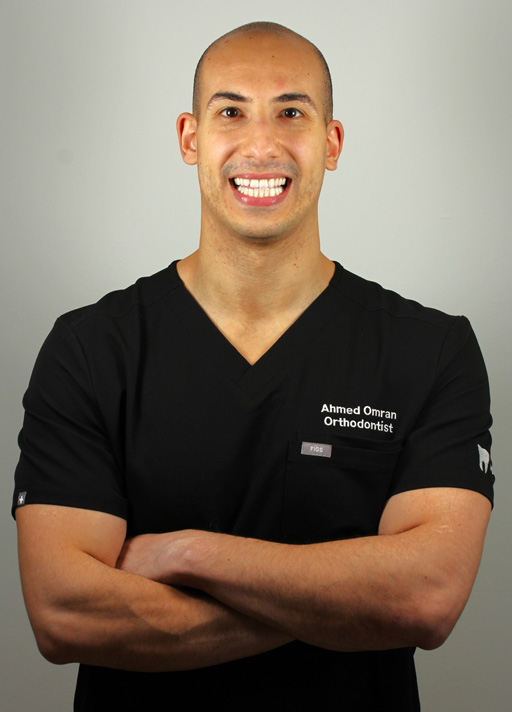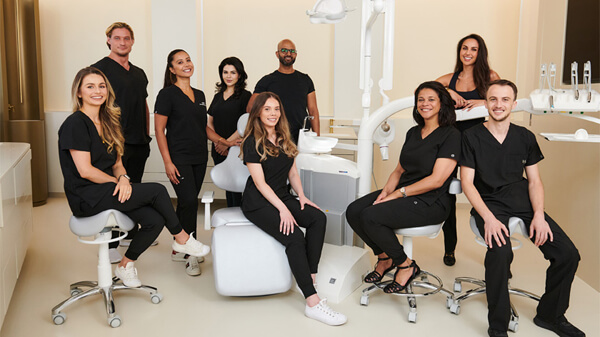Dr Ahmed Omran
Specialist Orthodontist
BDS (Distinction), MSc (Distinction), MOrth RCS Eng, MJDF, PGCert PCD (Distinction)
GDC No. 251541
Award-Winning Orthodontist 2023 Clinical Dentistry Awards
Dr Ahmed qualified from the University of Bristol in 2014, receiving a Bachelor’s degree in Dentistry with Distinction. He was awarded both Gold and Silver Medals for academic and clinical excellence. Following this, Ahmed worked in the South East of England, providing general dental services. He undertook a hospital multidisciplinary post, including restorative, paediatric, oral surgery, and special care dentistry in Surrey and Greater London. Dr Ahmed also completed a postgraduate certificate in primary care dentistry with Distinction. Later, he trained as a Senior House Officer in Oral and Maxillofacial Surgery in the South West of England, gaining experience in facial trauma, dentoalveolar, and orthognathic jaw surgery.
Dr Ahmed’s postgraduate orthodontic training took place at the prestigious Kingston and Guy’s and St. Thomas Hospitals. He obtained his MSc in Orthodontics with Distinction from King’s College London and is a member of the Royal College of Surgeons England, listed as a specialist in Orthodontics by the GDC.
Dr Ahmed provides high-quality orthodontic treatment for adults and children, emphasising clear aligner treatments with Invisalign®, clear/ceramic braces, self-ligating DAMON braces, and WiN lingual braces.
In his spare time, Ahmed enjoys scuba diving, skiing, golf, and keeping fit at the gym. He’s always up for a game of chess if you dare to challenge him!

Yes! Research shows straight teeth are more attractive. With a beautiful smile comes increased self-confidence, which can have hugely positive effects on many other aspects of your life. Anecdotally, people with straight teeth find them easier to clean and are more likely to look after their teeth so that they are less likely to have problems with their dental health in future.
This depends. In most cases, people manage to talk, eat and chew without any significant issues despite not having an ideal bite. However, certain types of bite can cause problems if they are severe. For example, people with open bites can have difficulty chewing certain types of food, people with deep bites can cause wear to their lower teeth or damage the gums of the lower and upper teeth, and people with crossbites can have a shift of the jaw when closing which can cause irregularity of the jaw joint and an apparent facial asymmetry.
This also depends! For minor tooth alignment/straight teeth problems, treatment can be as short as 6 months! For 'comprehensive' treatment (where we aim to straighten the teeth and fully correct the bite), the average orthodontic treatment takes around 18-24 months.
This varies depending on the type of appliance, whether we treat a single arch of teeth or both upper and lower arches (and whether we treat just the front 6-8 teeth or more), and the complexity of your treatment. We will give you a bespoke quote in writing once you have had an initial assessment, although indicative ranges can be found here.
In general, orthodontic treatment is a low risk treatment with minimal complications. Many of the risks are barely noticeable and have minimal to no long term problems. The main ones to be aware of are: discomfort/damage to the enamel or gums/root shortening/gum recession or black triangles/relapse.
Absolutely yes! No orthodontic treatment is perfectly stable. Research shows that following orthodontic treatment, the teeth will tend to want to move back towards their original positions (relapse) or a different position entirely (instability). We generally advise all our patients to wear both fixed and removable retainers following completion of their treatment on a long-term basis (at least 5 years but ideally as long as you are able) in order to maintain the positions of the teeth!
There are approximately 43,000 registered dentists in the UK, of which there are only around 1,400 registered specialist orthodontists. Orthodontic specialists have a minimum of 3 years postgraduate specialist training in craniofacial growth and assessment, orthodontic biomechanics and advanced orthodontic techniques. We would recommend you see an orthodontic specialist initially for a comprehensive assessment and discussion on the complexity of your case. While advances in technology and clear aligner therapy have greatly popularised the number of general dentists providing orthodontic treatment, they do not have the same level of training and are unlikely to have the same level of experience as an orthodontic specialist.


